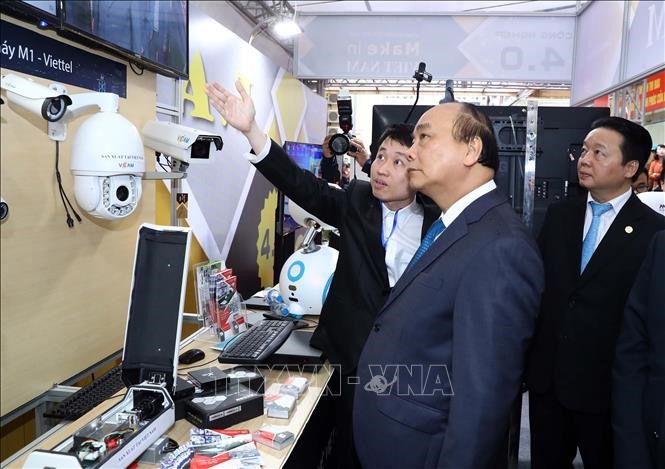 Society
Society

Prime Minister Nguyễn Xuân Phúc has asked the Ministry of Information and Communications (MIC) to increase Việt Nam’s rankings in information and communication technology (ICT).
 |
| Prime Minister Nguyễn Xuân Phúc views a display of ditigal technologies. He has asked the Ministry of Information and Communications (MIC) to increase Việt Nam’s rankings in information and communication technology (ICT). — VNA/VNS Photo Thống Nhất |
HÀ NỘI — Prime Minister Nguyễn Xuân Phúc has asked the Ministry of Information and Communications (MIC) to increase Việt Nam’s rankings in information and communication technology (ICT).
The Government leader made the request while addressing a conference organised by the MIC in Hà Nội on Tuesday to allocate tasks for 2019.
The PM recognised the significant contributions of the ICT industry to the country’s development in recent times, but expressed his dissatisfaction with Việt Nam’s low rankings in the field.
He said ICT should be a leading sector for the nation, but had slowed in recent years.
The World Economic Forum (WEF) had lowered Việt Nam’s rankings in the field due to the country’s poor preparations for the Fourth Industrial Revolution (Industry 4.0), the PM said, adding that this was the ministry’s responsibility.
He said the Government agreed with the ministry’s proposal to draft revised laws on telecommunications, frequency and press. The PM also suggested building institutions and training officials in the field, noting that this was an important task for the MIC.
PM Phúc asked the ministry to prioritise supporting tech start-ups and increase press management to serve national reforms. The ministry should develop cyber security businesses to turn Việt Nam into a powerhouse in this area, he said.
The PM said the production of telecommunications equipment must be increased, stressing that “Vietnamese network operators must use Vietnamese equipment”.
He also ordered the MIC to work with foreign social network providers to ensure they abide by Việt Nam’s laws, adding the ministry must adopt legal and technical measures to handle violations.
He hailed Minister of Information and Communications Nguyễn Mạnh Hùng for green-lighting tests of fifth-generation (5G) mobile networks in Việt Nam, firstly in HCM City.
While mentioning Zalo, a social network product developed by a Vietnamese IT firm with 45 million users, the PM asked the ministry to continue boosting social networks in Việt Nam to reach the same figures as their foreign peers.
In 2018, the MIC played an important role in facilitating and promoting the sustainable development of the telecommunications market. The Vietnamese domain “.vn” topped ASEAN in terms of the number of registrations and was among the top 10 national domains with the highest number of users in the Asia-Pacific region.
The software industry continued to maintain high growth of 13.8 per cent with revenue estimated at US$4.3 billion and exports of $3.5 billion.. The number of software businesses stood at nearly 10,000 with 120,000 workers.
The MIC also stepped up inspections of press portals to prevent the spread of false information that caused negative impacts on society and affected national interests.
Crucial tasks
The ICT was the foundation of the digital economy, digital society and Industry 4.0, so the MIC’s mission was to bring ICT into every aspect of social life for a resilient Việt Nam, said the ministry head.
"Technology is born to help solve problems. Where there is technology, there is a solution. Problems are seen everywhere and each of us can apply technology to solve them. A revolution in which the whole population uses technology will help Việt Nam develop," said Hùng.
"Việt Nam will stay in tune with the world in new technologies and will not stay behind in eight or ten years as in the case of 3G or 4G," he said, referring to the test of 5G frequencies this year.
Minister Hùng set a target to lift Việt Nam from 108th in the world rankings for telecommunications to 30th-50th in 2022.
Minister Hùng said digital-based areas, e-Government and smart cities would continue making headlines in 2019, so strategies for 2019 clearly identifying key tasks for each area were vital.
The official also underlined one of the crucial tasks was to review and eliminate overlapping legal documents that hindered the sector’s development as Industry 4.0 required changes in policies to serve new business modes born as a result of new technologies. — VNS



.jpg)
